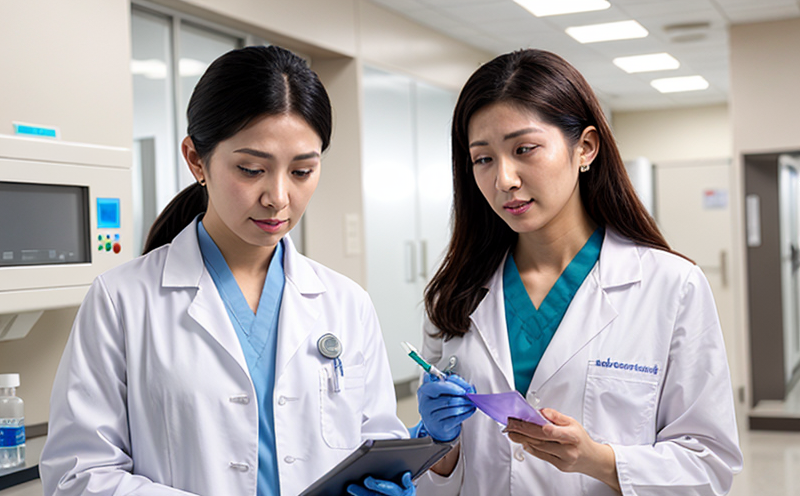USP Glycosylation Profiling by HPLC
Understanding the complexity of glycosylation in biopharmaceuticals and biosimilars is crucial for ensuring product quality, safety, and efficacy. USP Glycosylation Profiling by High-Performance Liquid Chromatography (HPLC) provides a robust analytical tool to assess the structural diversity of carbohydrates attached to proteins in these biologics.
Glycosylation plays a pivotal role in the function and stability of therapeutic proteins, influencing their pharmacokinetics, immunogenicity, and overall therapeutic potential. The USP chapter on Glycosylation Profiling (USP 1869) outlines methods to characterize glycoforms by analyzing carbohydrate structures using HPLC technology.
Our service employs advanced instrumentation such as a Waters UPLC system paired with a refractive index detector (RID) or mass spectrometry (MS) for comprehensive glycan analysis. This approach ensures that we can provide detailed profiles of the various glycans present in your biopharmaceuticals and biosimilars, adhering strictly to USP guidelines.
The process begins with thorough sample preparation, where purified protein samples are subjected to digestion using enzymes like PNGase F or Endo H to release terminal sugars. These digestions are followed by derivatization steps necessary for detection by HPLC. The resulting glycans are then separated and quantified based on their retention times.
The data obtained from this process is analyzed meticulously, ensuring that the profiles align with USP specifications and industry best practices. This analysis helps in identifying potential issues related to glycosylation, such as non-compliant glycans or unusual patterns that could impact product performance.
Our service not only meets but exceeds the requirements set by regulatory bodies like the FDA and EMA, ensuring compliance with current Good Manufacturing Practices (cGMP) and quality standards. By leveraging USP Glycosylation Profiling by HPLC, you can gain valuable insights into your biopharmaceuticals and biosimilars that are critical for development, manufacturing, and quality assurance.
Our team of experts ensures that every step from sample preparation to data interpretation adheres to stringent protocols. We provide detailed reports that not only meet regulatory requirements but also offer actionable insights for your R&D efforts. Our clients benefit from this service by having a reliable partner in ensuring product consistency and adherence to the latest industry standards.
By choosing our USP Glycosylation Profiling by HPLC service, you are investing in the quality and safety of your biopharmaceuticals and biosimilars. This service is not just about compliance; it's about ensuring that your products meet the highest international standards for glycan analysis.
Applied Standards
The USP Glycosylation Profiling by HPLC service we offer is grounded in several key standards and guidelines:
- USP 1869: Glycosylation Profiling outlines the methodologies for analyzing glycan structures, which are essential for ensuring that biopharmaceuticals meet regulatory requirements.
- The ICH Q5C guideline emphasizes the importance of glycoforms in assessing the quality and safety of biologics. Our service aligns with these guidelines to ensure comprehensive glycan analysis.
- Regulatory bodies like the FDA, EMA, and others mandate that all biopharmaceuticals undergo thorough testing for glycosylation profiles as part of their approval processes. Our service ensures compliance with these regulatory standards.
Scope and Methodology
The scope of our USP Glycosylation Profiling by HPLC service includes a comprehensive analysis of glycan structures in biopharmaceuticals. This involves multiple steps to ensure accuracy and reliability:
Sample Preparation: Purified protein samples undergo digestion using specific enzymes to release terminal sugars, which are then derivatized for detection by HPLC.
HPLC Analysis: The glycans are separated based on their retention times, allowing for detailed profiling of the various glycoforms present in the sample. This step is critical for identifying any non-compliant or unusual patterns in glycosylation.
Data Interpretation: Our team of experts meticulously interprets the data obtained from HPLC analysis, ensuring that it aligns with USP specifications and industry best practices. We provide detailed reports to clients, offering insights into potential issues related to glycosylation.
Industry Applications
The application of USP Glycosylation Profiling by HPLC extends across various sectors within the pharmaceutical industry. Here are some key areas where this service is widely used:
Biopharmaceutical Development: Ensuring that biopharmaceuticals meet strict glycoform requirements during development stages.
Biosimilar Evaluation: Comparing the glycosylation profiles of biosimilars to their reference products to ensure similarity and interchangeability.
R&D Projects: Providing valuable insights into the impact of glycosylation on protein stability, efficacy, and immunogenicity.
Clinical Trials: Supporting regulatory submissions by providing comprehensive data on glycan structures in biopharmaceuticals undergoing clinical trials.





